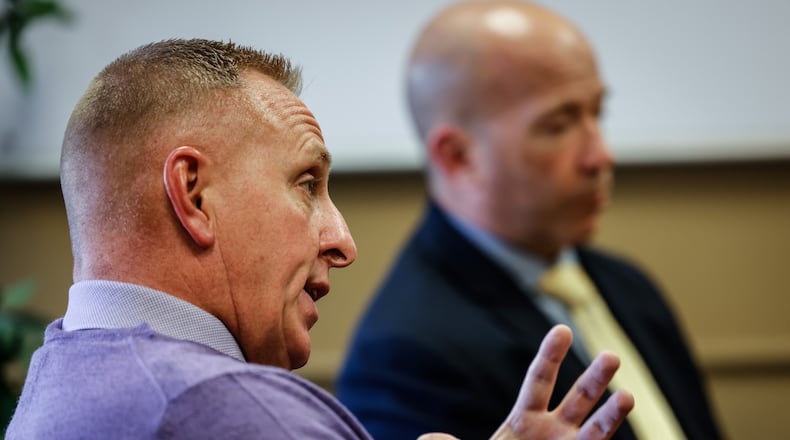“Every year we attend the Montgomery County memorial for homicide victims,” Dayton Police Major Brian Johns said. “We were talking about how can we as a department do more for the victims and their families. And I can’t think of anything more fitting than solving some cold cases.”
There are more than 1,000 cases that detectives will look into, Johns said. Some of those cases go back decades and Lt. Jason Hall said the work has already begun.
“What we are doing right now is we are laying the foundation, going through a lot of case files, building spreadsheets, looking and seeing what kind of evidence do we have in place, the witness lists and judge what is more workable,” Hall said.
Credit: JIM NOELKER
Credit: JIM NOELKER
He said the department is focused on the long term and solving as many cases as possible. Johns said victims of violent crimes are never forgotten, and he plans to meet with the cold case detectives every Friday to get an update on statuses of investigations.
The department is teaming up with University of Dayton interns who will help organize the cases. Retired detectives will also assist to try to identify cases that might have a high chance of being solved based on available evidence.
“The Dayton Police Department will continue to utilize advancements in technology such as DNA, forensic genealogy, computer forensics, and more, to help solve these homicide and sexual assault cases,” the department said.
The department will now have three full-time detectives working cold cases.
Carol Cranford, the mother of Corey Mitchell, a Dayton man who was killed in 2010 and whose case remains unsolved, said the cold case expansion is welcomed news.
“I’m very glad to hear that something is going to be done to enhance that cold case unit,” she told the Dayton Daily News.
Cranford said for years she only had one point of contact at the police department. She said she hopes the cold case unit detectives will stay focused on cold cases only so that they can develop new leads and bring justice for families who have suffered too long.
“It’s just time, some of these cases didn’t have to get cold and you need to separate (active) homicide cases from the cold cases so they can be given enough attention,” Cranford said.
Last year, the Ohio Attorney General’s Office created a new cold case unit to investigate unsolved crimes.
The new unit, based at the Ohio Bureau of Criminal Investigation, reaches out to local law enforcement agencies to initiate a fresh look at unsolved cases. The unit offers new forensic analysis and investigative resources, according to Steve Irwin, BCI spokesman.
Have a tip?
Anyone with information on an unsolved crime is asked to call the cold case unit at 937-333-7109.
About the Author



